Related Research Articles

Rage Against the Machine is an American rock band from Los Angeles, California. Formed in 1991, the group consists of vocalist Zack de la Rocha, bassist and backing vocalist Tim Commerford, guitarist Tom Morello, and drummer Brad Wilk. The band are known for their melding of heavy metal and rap music with punk rock and funk influences, and their revolutionary political views. As of 2010, they have sold over 16 million records worldwide. The band was nominated for induction into the Rock & Roll Hall of Fame in their first year of eligibility in 2017, then again in 2018, 2019, and 2021, though the bids failed.

The Zapatista Army of National Liberation, often referred to as the Zapatistas, is a far-left political and militant group that controls a substantial amount of territory in Chiapas, the southernmost state of Mexico.
Inside Out was a hardcore punk band from Orange County, California. It was fronted by Zack de la Rocha, later of Rage Against the Machine.
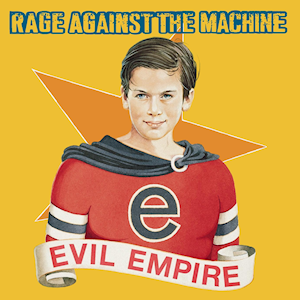
Evil Empire is the second studio album by American rock band Rage Against the Machine, released by Epic Records on April 16, 1996. It debuted at number 1 on the US Billboard 200 chart with sales of 249,000 copies, and the song "Tire Me" won a 1996 Grammy Award for Best Metal Performance; "Bulls on Parade" and "People of the Sun" were nominated for Grammys for Best Hard Rock Performance. On May 24, 2000, the album was certified triple platinum by the Recording Industry Association of America.

Zacharias Manuel de la Rocha is an American musician, singer, songwriter, rapper, and political activist. He is best known as the vocalist and lyricist of the rock band Rage Against the Machine. Through both Rage Against the Machine and his activism, de la Rocha promotes left-wing politics in opposition to corporate America, the military-industrial complex and government oppression.
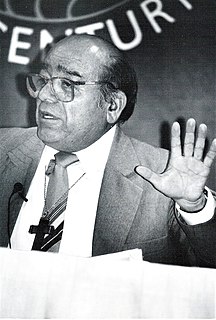
Samuel Ruiz García was a Mexican Catholic prelate who served as bishop of the Diocese of San Cristóbal de las Casas, Chiapas, from 1959 until 1999. Ruiz is best known for his role as mediator during the conflict between the Zapatista Army of National Liberation (EZLN) and the Institutional Revolutionary Party (PRI), a Mexican political party which had held power for over seventy years, and whose policies were often disadvantageous to the indigenous populations of Chiapas. Inspired by Liberation Theology, which swept through the Catholic Church in Latin America after the 1960s, Ruiz's diocese helped some hundreds of thousands of indigenous Maya people in Chiapas who were among Mexico's poorest marginalized communities.

The Mexico–United States border is an international border separating Mexico and the United States, extending from the Pacific Ocean in the west to the Gulf of Mexico in the east. The border traverses a variety of terrains, ranging from urban areas to deserts. The Mexico–United States border is the most frequently crossed border in the world, with approximately 350 million documented crossings annually. It is the tenth-longest border between two countries in the world.

"People of the Sun" is the second single by American rock band Rage Against the Machine for their 1996 album Evil Empire. Written in 1992, the song is about the Zapatista revolution. Lead vocalist Zack de la Rocha wrote the song after a visit to Chiapas in southern Mexico. "People of the Sun" also has a music video. It was nominated for a Best Hard Rock Performance Grammy in 1998, but it lost to The Smashing Pumpkins' "The End Is the Beginning Is the End".
The Other Campaign is a political program by the Zapatista Army of National Liberation for the recognition and protection of indigenous rights and autonomy in Mexico. This program began in January 2006, and sent Subcomandante Marcos, the main spokesperson for the campaign, to travel across Mexico for several months. This tour was intended to create connections among the Zapatistas and pre-existing resistance groups throughout Mexico.
"Wake Up" is a song by American rock band Rage Against the Machine. It is the seventh track from their self-titled debut album. While never released as a single, it remains a staple of their live shows and is usually played as the last song before the encore. It appears in the 1999 film The Matrix to punctuate the final scene, which has increased its exposure and cultural cachet.

A Place Called Chiapas is a 1998 Canadian documentary film of first-hand accounts of the Ejército Zapatista de Liberación Nacional (EZLN) the and the lives of its soldiers and the people for whom they fight. Director Nettie Wild takes the viewer to rebel territory in the southeastern Mexican state of Chiapas, where the EZLN live and evade the Mexican Army.
Neozapatismo or neozapatism is the political philosophy and practice devised and employed by the Zapatista Army of National Liberation, who have governed a number of communities in Chiapas, Mexico since the beginning of the Chiapas conflict. According to its adherents, it is not an ideology: "Zapatismo is not a new political ideology or a rehash of old ideologies. .. There are no universal recipes, lines, strategies, tactics, laws, rules or slogans. There is only a desire: to build a better world, that is, a new world."
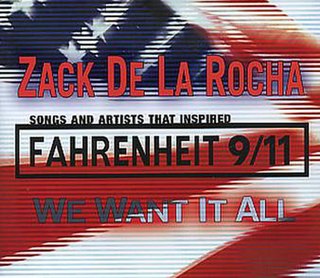
We Want It All is one of only two songs the Rage Against the Machine vocalist Zack de la Rocha released while the band was disbanded. Out of the twenty or so tracks which De La Rocha and Trent Reznor of Nine Inch Nails collaborated on, this is the only track of those sessions which has been released. The song was produced by Reznor and was recorded at Nothing Studio in New Orleans in 2003. It was mixed by David Bianco at Sunset Sound in Los Angeles and mastered by Steve Marcussen.
Instituto Cultural Tampico (ICT) is a K-12 private school in Tampico, Tamaulipas, Mexico. It was founded in 1962 by the Society of Jesus. Its primary and secondary education programs are validated by the Secretaría de Educación Pública. Its high school is affiliated with the Sistema Universitario Jesuita (SUJ).
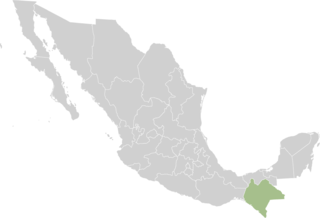
The Chiapas conflict comprises the 1994 Zapatista uprising, the 1995 Zapatista crisis and ensuing tension between the Mexican state and the indigenous peoples and subsistence farmers of Chiapas from the 1990s to the present day.

Rafael Sebastián Guillén Vicente is a Mexican insurgent, the former military leader and spokesman for the Zapatista Army of National Liberation (EZLN) in the ongoing Chiapas conflict, and an anti-capitalist and anti-neoliberal globalization icon. Widely known by his initial nom de guerreSubcomandante Insurgente Marcos, he has subsequently employed several other pseudonyms: he called himself Delegate Zero during the Other Campaign (2006–2007), and since May 2014 has gone by the name Subcomandante Insurgente Galeano, which he adopted in honor of his fallen comrade "Teacher Galeano". Marcos bears the title and rank of Subcomandante, as opposed to Comandante, because, he is subordinate to, and under the command of, the indigenous commanders who constitute the EZLN's Clandestine Revolutionary Indigenous Committee's General Command.
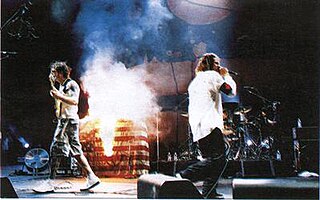
The political views and activism of Rage Against the Machine are central in the band's music and public image. Rage Against the Machine is an American rock band formed in Los Angeles in 1991. The band's line-up consists of vocalist Zack de la Rocha, bassist and backing vocalist Tim Commerford, guitarist Tom Morello and drummer Brad Wilk. Critics have noted Rage Against the Machine for its "fiercely polemical music, which brewed sloganeering left wing rants against corporate America, cultural imperialism, and government oppression into a Molotov cocktail of punk, hip-hop, and thrash."
The 1995 Zapatista Crisis refers to the aftermath of the 1994 Zapatista uprisings, which began as a result of the 1991 revision of Article 27 of Mexico's Constitution. This revision caused unrest in Chiapas's Southern Mexican state, as many indigenous tribes believed the article's revision negatively affected them due to the new economic policies. Violence ensued over several years, and the many peace deals proposed by the Mexican government were rejected. In the early days of the new government administration, President Ernesto Zedillo took a series of decisions that contradicted decisions from the earlier administration.
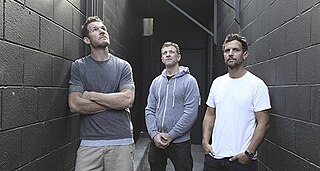
Wakrat is an American trio composed of Tim Commerford, Mathias Wakrat and Laurent Grangeon. The heavily alt-punk-influenced group released their self-titled debut album in 2016.
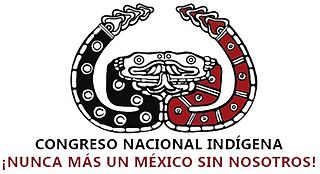
The National Indigenous Congress is an organization of communities, nations, towns, neighbourhoods and indigenous tribes of Mexico. In its own words, the CNI is "... a space of unity, reflection and organization of the indigenous peoples of Mexico, promoting the integral reconstitution of the original peoples and the construction of a society in which all cultures, all the colors, all the towns that we are Mexico". Since its foundation, among several activities, five national congresses have been held.
References
- ↑ ShoVermilion (February 22, 2010). "Rage Against The Machine - Without A Face, Live In Hilversum NETHERLANDS (May 27, 1996)". YouTube. Retrieved August 7, 2022.
- ↑ Ramirez Cuevas, Jesus (July 7, 1998). "Zack de La Rocha: Interview by Jesus Ramirez Cuevas". the complete RATM site.
- ↑ Stenning, Paul (2008). Rage Against the Machine - Stage Fighters. Bonnier Zaffre. ISBN 978-1-78418-967-9.